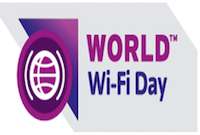The inaugural “World Wi-Fi Day,” which was observed yesterday, drew praise from Mike O’Rielly, member of the Federal Communications Commission since 2013.
|
|
“Using unlicensed spectrum to offer Wi-Fi has completely changed the reach and breadth of Internet offerings, and for that, we should all be thankful,” he said in a published statement. “At the same time, this day also provides an opportunity to recognize those people worldwide who still don’t have the technology and identify ways this can be fixed.”
His statement continues:
“Every day, Wi-Fi handles more than half of all Internet traffic and brings wireless Internet availability to billions and billions of devices. It connects individuals to home networks and throughout work settings. It’s nearly omnipresent and often offered for free in coffee shops, libraries, airports, universities, hotels and many other places, delivering fast download speeds and once unimaginable bandwidth capacity. And, we can’t ignore its contributions to overall economic productivity, which can be likely measured in the hundreds of billions or trillions of dollars produced and man-hours saved.
“One of the best ways to realize Wi-Fi’s impact is to imagine life without it. Here are just a few scenarios to illustrate this point. First, we would still be dragging fiber throughout the inner workings of commercial buildings, residences, and campuses, dramatically raising service costs while reducing availability. Internet users would be required to plug into hardwired ports, saying goodbye to device mobility.
Wi-Fi Saves Money
 |
“Remember how fun it was plugging your Cat-5 Ethernet cord into a wall? Second, consumers would have to rely on more expensive data plans from commercial wireless carriers. Just imagine the cost of binge watching your favorite show or movies over traditional cell phone networks. And third, consumers would pay more for poorer service, because mobile providers would suffer more congestion and be forced to offer slower service speeds as traffic couldn’t be offloaded to cheaper, Wi-Fi systems.
“Notwithstanding all of the success to date, Wi-Fi’s future looks even brighter. Given the amazing adoption rate and improvements in performance, it’s more likely than not that Internet data traffic will continue to shift to Wi-Fi for the foreseeable future and security enhancements will reverse threats of exposed consumer experiences. Moreover, ubiquitous Wi-Fi voice calling and a truly mesh network seem not far away.
“Additionally, Wi-Fi incorporation into location technologies seems a guarantee, especially for hard to reach areas, such as building interiors. Wi-Fi also is likely to branch out to unlicensed millimeter wave spectrum bands (e.g., 60 GHz), via the 802.11ad standard (WiGig), allowing increased capacity, lower latency and greater speeds.
FCC Has Done “Good Job” Promoting Wi-Fi
“The FCC, where I have the pleasure of serving, generally has done a good job of providing an environment for Wi-Fi to flourish in the U.S. But more needs to be done to promote future opportunities. This includes making more spectrum bands available for unlicensed use to allow super-wide Wi-Fi channels and making a firm commitment to opening up the 5.9 GHz band for unlicensed use, assuming sharing with automotive safety systems is proven possible.
“We also need to explore whether, and to what degree, Wi-Fi can play a factor in connecting those in the hardest to reach parts of the U.S. without Internet service. Maybe Wi-Fi is a good technology to stretch existing networks beyond their edges to more rural portions of our nation.
“Similarly, Wi-Fi may be the cheapest and fastest way to bring Internet access to the huge populations of the world now without it. By some estimates, three to four billion people do not have reliable Internet availability. Certainly in poorer urban centers Wi-Fi makes a ton of sense to connect the unconnected. It can be done for a fraction of the cost of licensed networks and is a known, proven technology, unlike drones, balloons and so forth. Admittedly, this will require serious planning and the will to make it happen, but that is exactly the skillset of those involved in delivering Wi-Fi today.
“No matter how people choose to celebrate World Wi-Fi Day, it only seems appropriate to acknowledge the wonderful technology advances made possible by its existence."

 Michael O'Rielly
Michael O'Rielly
 Lo Isidro, senior director at Real Chemistry with more than a decade of strategic communications and PA experience, has joined Narrative Strategies.
Lo Isidro, senior director at Real Chemistry with more than a decade of strategic communications and PA experience, has joined Narrative Strategies. Nelson Fernandez, former North American chair of APCO Worldwide and managing director of Burson-Marsteller, has joined Volunteers in Medicine Berkshires as director of communications and PA.
Nelson Fernandez, former North American chair of APCO Worldwide and managing director of Burson-Marsteller, has joined Volunteers in Medicine Berkshires as director of communications and PA. Lilit Bargar, who was most recently an EVP in the healthcare practice at Weber Shandwick, comes on board at GCI Health as EVP, corporate practice lead.
Lilit Bargar, who was most recently an EVP in the healthcare practice at Weber Shandwick, comes on board at GCI Health as EVP, corporate practice lead.
 Five ways that successful thought leaders are made.
Five ways that successful thought leaders are made.


 Have a comment? Send it to
Have a comment? Send it to 
No comments have been submitted for this story yet.